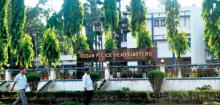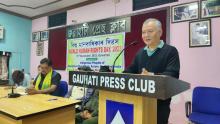India’s former President Ramaswamy Venkataraman had to face an unprecedented controversy arising out of political situation in the country during his tenure. A veteran Socialist leader and constitutional expert, Madhu Limaye, accused him of tilting towards Bharatiya Janata Party (BJP). Expressing his distress over the President’s proposals on putting off the elections, setting up a National Government, establishing a nominated Constituent Assembly and ‘ruling without elections and without an elected Parliament’, Limaye said, he hoped that in the difficult times the President would act as Constitutional President, leaving formation of government, including negotiations, combinations and coalitions to the Parliamentary parties.
The correspondence that had taken place between Limaye and Venkataraman, clearly indicated that the former had taken strong exceptions to the President refusing to unveil the portrait of Dr Ram Manohar Lohia in the Central Hall of the Parliament and ‘enthusiastically agreeing to unveil the portrait of Dr Shyama Prasad Mukherjee. Expressing that he did not like to compare both the leaders and stating that he had nothing against Dr Mukherjee, Limaye reminded the President that Dr Lohia was also a freedom fighter and a member of Congress Socialist Party. ‘Whatever be your personal opinion of Lohia and however intensely you disliked him, you should have controlled your dislike or allergy and unveiled his portrait. You cannot wish out of existence the great services of Lohia in the cause of freedom. But you refused. This cannot but attributed to your bias against Lohia’, Limaye wrote in a letter to President Venkataraman on May 29, 1991.
Limaye alleged that the President’s attitude was bound to be interpreted as being influenced by the newspaper reports about the rising electoral tide of the BJP, whose support he wished to enlist for the ‘ambitious projects’ being entertained by him. The President replied to Limaye on June 1,1991,but the latter was not satisfied with his reply. In his second letter, Limaye regretted that he could not accept the explanation about the President not unveiling Dr Lohia’s portrait. He wrote that he was informed that the President did not agree earlier to unveil Dr Mukherjee’s portrait also, but on persistence from BJP leader Lal Krishna Advani ultimately he agreed to reconsider his earlier decision. He alleged that the President’s rethinking was based on the information that BJP was gaining strength.
It was apparent from the exchange of correspondence between Limaye and Venkataraman that the President did not accept the contention that he was behind the moves to put off the elections, set up a national government and go in for related measures. The President suggested in his reply to Limaye that was going through very reliable sources.
Meanwhile, the President’s message to the Nation on June 8, 1991 was another step to come under criticism in certain circles. Amidst the postponed election process, Venkataraman’s call was unprecedented. No head of the country intervened at such a late stage and appealed to political parties to abstain from using muscle power to try to gain power through malpractices in elections. He stated that to address Independence Day is customary for the President. He took another opportunity to share some deeply felt thoughts about the second and final phase of polling scheduled for June 12 and 15. He himself had been flooded with complaints of unfair electoral practices and violence connected with polls, which led to his anxiety. His appeal was intended to have free and fair polls. The assassination of Rajiv Gandhi was the main reason behind his anxiety, which had led to the postponement of elections during which the President had to address the Nation.
By convention and norms, the President just cannot go on air. His address was usually cleared by the cabinet committee on Political Affairs. The situation was different that time because the care taker Chandrasekhar Government had been asked to continue till alternative arrangements were made.
However, the President was believed to have spoken to the Prime Minister of his desire to address the Nation at this critical juncture. Ignoring the call of the situation certain political circles had reservations over the President’s steps, which were not spared from criticism under any circumstances.







Add new comment